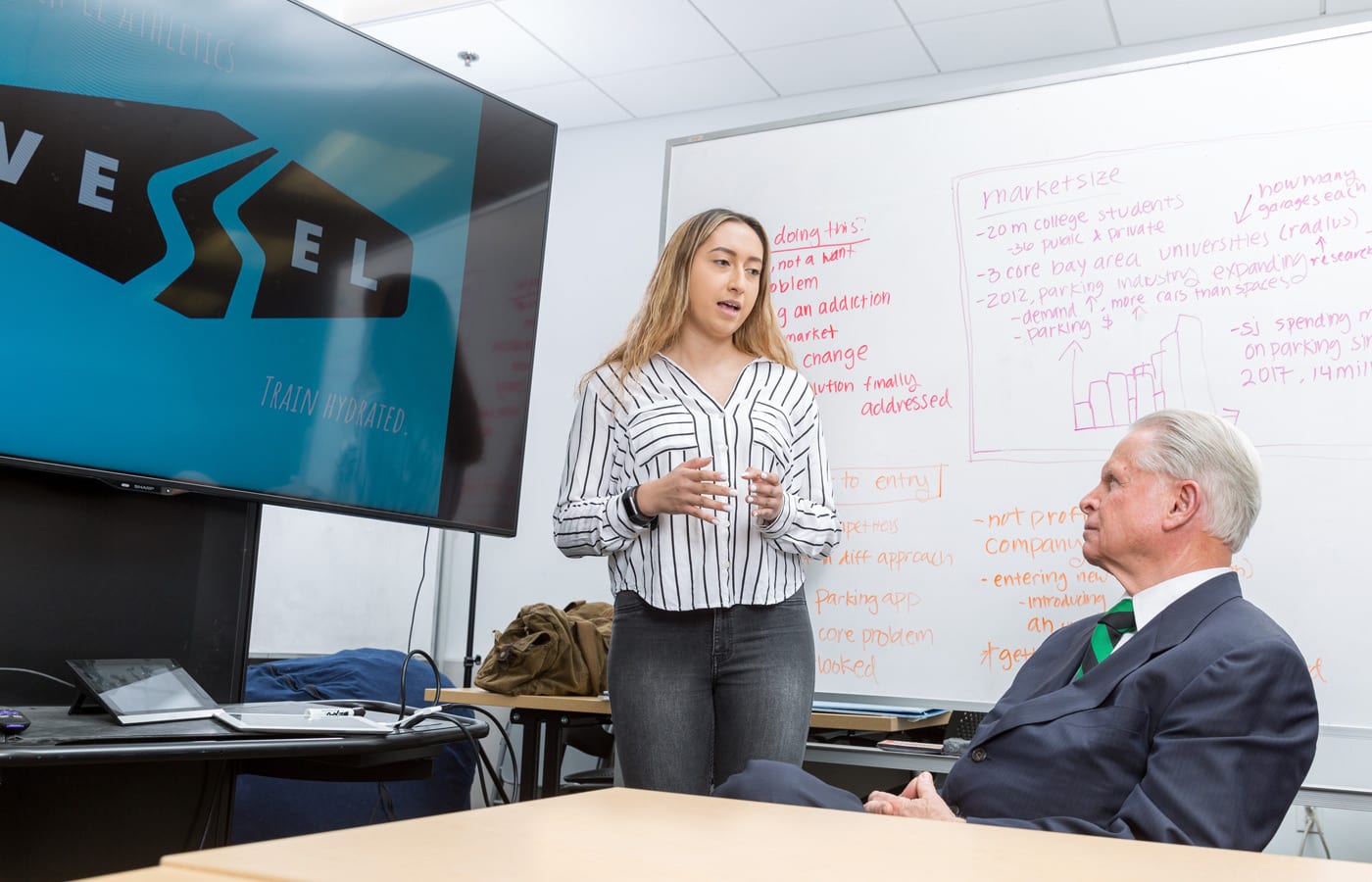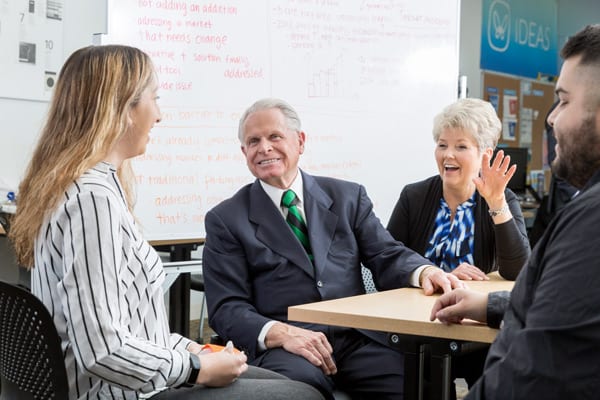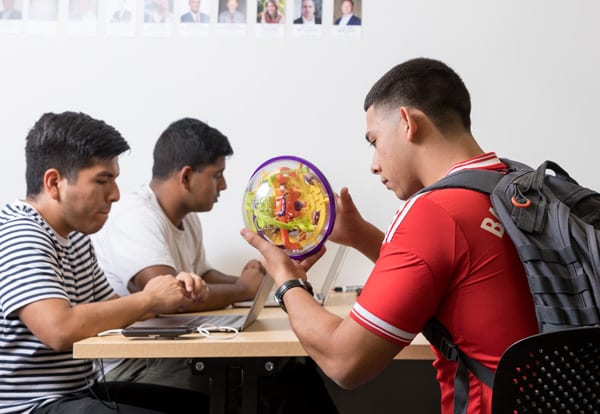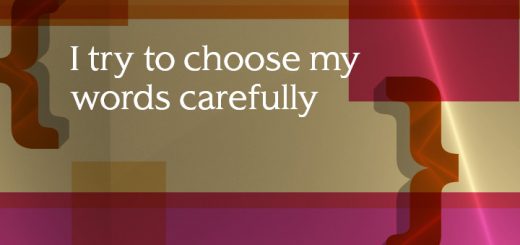Big Network, Small World

The Ideas club is a student-led startup accelerator, says Jasmine Sanchez. Inside The Idea Lab, SJSU’s campus incubator, professors, entrepreneurs and alumni mentors from different industries provide feedback to students. Ray Zinn worked with Jasmine Sanchez and other students through the ZinnStarter program. Photo by David Schmitz.
Learning an entrepreneurial mindset prepares students for work and life in Silicon Valley.
It was time to pitch her idea. In a black blazer and slacks, Jasmine Sanchez took her place next to a large LCD presentation screen, glowing bright blue with the logo for Vessel Athletics, the company she’s trying to launch. Outside the clear glass doors of the Idea Lab, the voices and footsteps of San Jose State students echoed in the corridor of the Diaz Compean Student Union. But Sanchez, ’20 Business, remained focused, having carefully considered every detail of her presentation, including her outfit.

“Our focus is on helping students understand what it takes to succeed in life.” says DeLona Zinn (center-right). She had enjoyed seeing the ZinnStarter students, like Andrew Amador (right) and Sanchez (left), present their ideas to her husband, Ray Zinn (center-left) Photo by David Schmitz.
Among the feedback offered during student pitches, Ray Zinn, ’68 MS Business, told Sanchez and the other ZinnStarter Fellows that they have to dress professionally—one level higher than they think they have to—if they want to be taken seriously. And they do.
“It felt like I was on ‘Shark Tank,’ honestly,” Sanchez says, laughing. “But it was a great experience that really helped me take my startup to the next level.”
Zinn, who incidentally wore a gray sport coat and tie with a fuchsia shirt for the pitch session, is the retired founder of the semiconductor company Micrel and the longest serving CEO in Silicon Valley. When he retired at 78 a few years ago, he created the ZinnStarter program to help students “learn to run a company while they’re still in school,” says Zinn. “They get a chance to learn if they’re going to fail or succeed.”
ZinnStarter is now one component of the growing efforts to expand entrepreneurship education at San Jose State, says Anu Basu, professor and director of SJSU’s Silicon Valley Center for Entrepreneurship (SVCE). In SVCE’s competitions, including the Silicon Valley Innovation Challenge (SVIC) and Business Plan Competition, the winners get prizes at the end. With ZinnStarter, the funding comes at the beginning and the selected fellows have to show progress during updated pitches every month over the course of a semester. Zinn insisted that students decide who gets the awards, so a student board was formed, led by the student-run Ideas Club, with Basu as the faculty adviser. Another requirement was that students be connected with mentors, who are entrepreneurs, investors or professors. The best part? SVCE’s programs are open to all students, not just business majors.
“Everything we do is across the university. We’ve had students from engineering, computer science, animation and design participate, for example,” says Basu. “It’s something I’m passionate about because true innovation requires multidisciplinary teams and insight from different functions and areas.”
Up and Running
Inside the Idea Lab is where student startups and the Ideas Club meet and “where a lot of the action goes on,” says Sanchez, who is the club’s outreach coordinator. Without the club or the collaborative space, Sanchez says she doesn’t know how she otherwise would have met her partner, Andrew Amador, ’19 Industrial Design.
Sanchez came up with the idea for an athletic top with a removable water pouch, when she took up running “as a competition for myself,” she says. “After pitching to the Ideas Club, I started talking to more people and getting feedback, and I realized I wanted to run with it and turn it into a business. But I soon learned that I needed help.”
She didn’t know how to sew or create a physical product, and even asked her family for help. “It was just not working out,” Sanchez says. She told Amador about her idea and what kind of features she wanted to include, and he worked on the physical product. Meanwhile, Sanchez focused on the business side—creating a business plan and going out and talking with customers. The team competed at the SVIC and then applied for and were accepted to the ZinnStarter program. To ground all of this work in business principles, Sanchez is also working on her startup in Anu Basu’s Venture Lab or V-Lab class, where students build a product, get feedback, iterate and gain the confidence they need to launch a business over the course of a semester, and Steve Bennet’s Startup Founders and Funders course.

Anu Basu (left) and Dan Moshavi (right) work to help students (below) to develop an entrepreneurial mindset that will benefit them no matter what they do. Photo by David Schmitz.

Inside the Idea Lab. Photo by David Schmitz.
At San Jose State since 2006, Bennet splits his time between teaching at SJSU, angel investing, and doing executive and chief financial officer work for startups. He says he has enjoyed the opportunity to work with Basu and others to build an entrepreneurship education program from the ground up. Courses now include Entrepreneurship Laboratory or E-Lab, V-Lab, Startup Founders and Funders and Management of Innovation. Before SJSU developed these courses, Bennet says the university was primarily preparing students to be successful at big Silicon Valley companies. “There’s nothing wrong with that. We should continue doing that because it’s important,” he says. “But a lot of the students were kind of afraid to go to a startup or start something new. Part of that was not exposing them to these opportunities.”
Many SJSU students come from entrepreneurial families, but may not think of a family-owned restaurant, for instance, as entrepreneurship. Growing up in a family of business owners, Sanchez says they definitely influenced her career and life goals. Her dream has always been to start her own business. “Personally, I don’t have an interest in working for a big company like Google or Facebook,” says Sanchez. “I like the startup ecosystem where everything is constantly changing and things are in your hands. I like that pressure. It’s exciting and keeps you on your feet.”
Entrepreneurship means creating your own opportunities and giving you the ability to do what you want with your career, Bennet says. “You’re building something but you’re also able to offer something to others by hiring employees. There’s a lot more flexibility and freedom. It’s hard. Not everyone is cut out for it. A lot of students want to test their toes in the water because they’re in Silicon Valley.”
Soon, the Lucas College and Graduate School of Business plans to launch the Spartan Angel Network, which would allow SJSU to accept philanthropic gifts to invest in student and alumni companies, explains Dan Moshavi, dean of the college. “Our role is helping students who are not part of the traditional Silicon Valley ecosystem understand it and get access to it,” says Moshavi.
Business Education for Life
Silicon Valley is a competitive place, even with all the right connections to the entrepreneurial ecosystem. Nine out of 10 startups fail within the first three years, says Zinn, author of Tough Things First, a book he uses as part of the ZinnStarter program. The goal of ZinnStarter is to cut the failure rate to five out of 10 by instilling in students his philosophy of starting every day by doing your most challenging task first, or “eating the ugly frog,” as Zinn puts it.
“Our role is helping people who are not part of the traditional Silicon Valley ecosystem understand it and get access to it.” — Dan Moshavi, dean, Lucas College and Graduate School of Business
Discipline, along with integrity and respect, were the values around which Zinn built Micrel, a company known for its low employee turnover. He and his wife, DeLona, who attended San Jose State in the 1950s, put people first and made the company an extension of their family. The point of entrepreneurship, they say, is not to make money.
“Everyone is an entrepreneur. All that means is that you create, innovate and negotiate,” Zinn explains. He hopes that his humanistic approach and tough love during the ZinnStarter pitch sessions will help students succeed. That’s what is most important, he says. “I may not help everybody, but I’m going to help somebody.”
Bennet calls San Jose State “a big network, small world,” with 35,000 students, tens of thousands of alumni in the area, “but there are pockets of people who have created connections.” Having faculty members like Bennet and Basu, who have industry connections, along with alumni mentors and supporters like the Zinns, is key to growing opportunities for students, says Moshavi. “Here in Silicon Valley, there’s a pay-it-forward mentality. There’s a much greater willingness to connect people based on ideas.”
According to Basu, there are a lot of mentors helping SJSU. “Alumni and other professionals want to support our students because they could be the next big startup. Ideally we will get some exciting companies coming out of San Jose State,” says Basu. “But all of the activities that students participate in will help them be more entrepreneurial whatever they do.”
Sanchez and her fellow Ideas Club officers regularly reach out to accelerators, incubators, startups and alumni in Silicon Valley. On the wall in the Idea Lab, you’ll see photos of the club’s group of mentors proudly displayed. Sanchez went from talking about her product to developing the prototype and understanding the financials in her business plan. She is certainly on her way.
“My dream is to keep going with Vessel Athletics, to be working on it full time by the time I graduate. I hope to have a final product and start selling it to customers by then,” she says. “I have two years until I graduate so the pressure is on. I’m passionate about this. That’s the goal. I know that I am in charge of my own future.”



